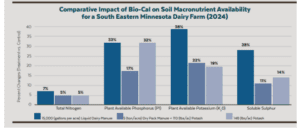Potassium and sulfur are essential for plant health, impacting water regulation, stress resistance, grain quality, and protein synthesis. Deficiencies can reduce soil base saturation and therefore over all soil health and yields. Bio-Cal® enhances the availability of these nutrients, supporting optimal soil fertility.
In 2023-2024 trials, Bio-Cal improved potassium availability in 90% of samples, increasing soil potassium by 9% and base saturation K% by 10%. This led to a 52 lbs/ac increase in K₂O, demonstrating its impact on nutrient cycling.

Why does soil base saturation matter?
Soil base saturation is crucial for soil health, directly affecting nutrient availability. Its ideal range is 60-80%, ensuring balance among calcium, magnesium, and potassium. Low base saturation (high hydrogen ions, low pH) restricts nutrient access, while excess saturation (excess alkaline cations) can cause imbalances.
Optimizing soil base saturation:
- Enhances root penetration and water movement through better soil aggregation.
- Regulates moisture retention and drainage, preventing waterlogging.
- Maintains pH balance to avoid nutrient deficiencies or toxicity.
With its proven ability to improve potassium and sulfur availability, Bio-Cal® can improve soil base saturation, leading to higher yields and crop resilience from drought, pests, and disease. Contact a sales consultant or local dealer to place an order HERE: https://www.midwesternbioag.com/contact/.

